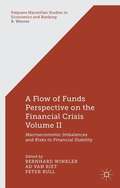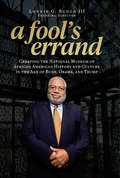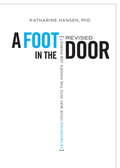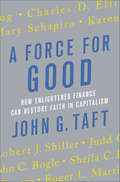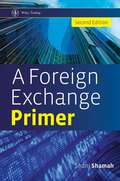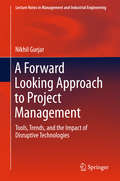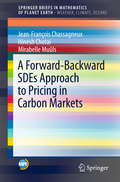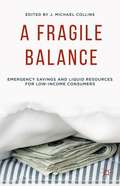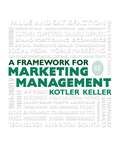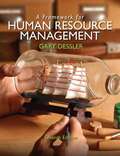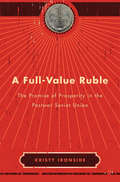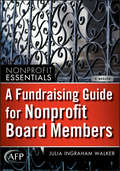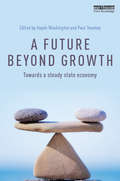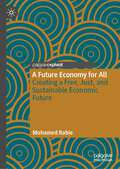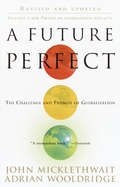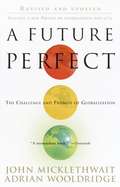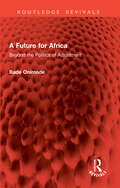- Table View
- List View
A Flow-of-funds Perspective On The Financial Crisis
by Peter Bull Bernhard Winkler Ad Van RietProvides a comprehensive overview of a broad range of uses of the flow of funds within the central bank community as well as in the academic field, prepared by international experts in the field. Based on the crisis experience, it offers an overview of lessons for macrofinancial analysis and financial stability.
A Fool's Errand: Creating the National Museum of African American History and Culture in the Age of Bush, Obama, and Trump
by Lonnie G. Bunch IIIFounding Director Lonnie Bunch's deeply personal tale of the triumphs and challenges of bringing the Smithsonian National Museum of African American History and Culture to life. His story is by turns inspiring, funny, frustrating, quixotic, bittersweet, and above all, a compelling read.In its first four months of operation, the Smithsonian National Museum of African American History and Culture surpassed one million visits and quickly became a cherished, vital monument to the African American experience. And yet this accomplishment was never assured. In A Fool's Errand, founding director Lonnie Bunch tells his story of bringing his clear vision and leadership to bear to realize this shared dream of many generations of Americans. Outlining the challenges of site choice, architect selection, building design, and the compilation of an unparalleled collection of African American artifacts, Bunch also delves into his personal struggles--especially the stress of a high-profile undertaking--and the triumph of establishing such an institution without mentors or guidebooks to light the way. His memoir underscores his determination to create a museum that treats the black experience as an essential component of every American's identity.This inside account of how Bunch planned, managed, and executed the museum's mission informs and inspires not only readers working in museums, cultural institutions, and activist groups, but also those in the nonprofit and business worlds who wish to understand how to succeed--and do it spectacularly--in the face of major political, structural, and financial challenges.
A Force for Good: How Enlightened Finance Can Restore Faith in Capitalism
by John G. TaftAfter the crisis of 2008, the social contract between the financial industry and everyone else was badly broken-perhaps, it seemed, irrevocably. Since then, banks have paid out billion-dollar settlements and Congress has passed some new laws, but a deeper rapprochement is still missing. John Taft has gathered some of the greatest financial minds of our time to explore how Wall Street can harness the same creative energy that invented credit default swaps and channel it towards the public good- in the form of a stable retirement system, investment strategies that protect the environment and reward responsible corporate behavior, and a financial industry with a culture of ethics, integrity and client focus. These perspectives, from a who's who of leaders in the field, offer a blueprint for a new kind of responsible finance and banking that secures the future for everyone. Contributors include: * Robert Shiller on financial capitalism and innovation*Charles D. Ellis on restoring ethical standards*Sheila Bair on regulatory reform *John C. Bogle and Mary Schapiro on rebuilding investor trust *Judd Gregg on long-term fiscal imbalances *Barbara Novick on the retirement savings gap *David Blood on sustainable finance.With so much brainpower in the financial sector, the potential for change is limitless. A Force for Good is the call to action the industry sorely needs.
A Foreign Exchange Primer
by Shani ShamahThis book will provide a thorough introduction to the foreign exchange markets, looking at the main products through to the techniques used, coverage of the main participants, details of the various players, and an understanding of the jargon used in everyday dealings. Written in a concise and accessible manner, it will be an ideal introduction for anyone looking to become involved in the FX markets, from dealing rooms or sales perspectives, to novice investors.The new edition has been updated to reflect the changes that have taken place in the industry over the past few years. Most chapters have been enhanced and this new edition now features new material on the psychology of trading, the psychology of price movement and online trading.
A Forest Environment Tax Scheme in Japan: Toward Water Source Cultivation
by Keiko NakayamaThis book is a work that focuses on the forest environmental tax. Forest resources have played a major role in preventing global warming by absorbing carbon dioxide and supplying oxygen. However, global economic growth has adversely affected the global environment and has exacerbated global warming due to excessive consumption of forest resources. The functions or “services” of forests are diverse, but the interest of the citizenry in forest cultivation is scarce since forests are public goods. Concurrently, Japanese forestry, which has played an important role in forest conservation, is steadily declining, and it is no longer possible for private forest operators to maintain the forest environment. Therefore, in order to realize sustainable economic growth, it is necessary to formulate policies for the conservation of appropriate forest environments. Forest conservation is an especially important policy issue for Japan, where two-thirds of the country is forested. In Japan, a forest environmental tax is being introduced as a forest conservation policy. As of 2021, the forest environmental tax has already been introduced in about two-thirds of the prefectures and soon will be introduced as a national tax. In this book, the significance and issues of the forest environmental tax will be sorted out, and the status of the introduction of the forest environmental tax in Japan will be compared with that of other countries. In addition, there is additional material regarding the water source conservation fund in Toyota City, Aichi Prefecture, a system similar to the forest environmental tax.
A Forward Looking Approach to Project Management: Tools, Trends, and the Impact of Disruptive Technologies (Lecture Notes in Management and Industrial Engineering)
by Nikhil GurjarThis book is intended as a basis for advanced treatment of concepts in project management. In the current scenario where most questions are answered through the internet, the knowledge element in project management has come under the influence of disruptive technologies. In other words, project managers no longer get 'points' for knowing something that is easily available on the internet. This has far-reaching consequences. The present day project managers need to orient themselves to newer benchmarks of what is required for success on the business front. This book deals with a few such advanced concepts in project management. This book is not designed as an elementary primer to the field of project management, rather it is an advanced level treatment on the subject, to be read after the preliminary study has already been completed. The book is designed for practicing project managers, and graduate students in engineering and management, who need to understand the dynamics that are typically encountered in a project-based environment. The content in the book is based on extensive study of literature and training programs. Many of the tools have been developed on the basis of modeling and simulation methods that are specially designed by the author. These were tested at several live projects across the globe. Most of the exercises in the book are actually meant for the reader to perform as they go. The book is not designed with a 'read-all-and-come-back-later' approach, rather it focuses on 'learning by doing', whereby the reader is expected to do the exercises before reading on. The book will prove useful in self-learning, as well as in classroom teaching and professional training programs.
A Forward-Backward SDEs Approach to Pricing in Carbon Markets (Mathematics of Planet Earth)
by Jean-François Chassagneux Hinesh Chotai Mirabelle MuûlsIn Mathematical Finance, the authors consider a mathematical model for the pricing of emissions permits. The model has particular applicability to the European Union Emissions Trading System (EU ETS) but could also be used to consider the modeling of other cap-and-trade schemes. As a response to the risk of Climate Change, carbon markets are currently being implemented in regions worldwide and already represent more than $30 billion. However, scientific, and particularly mathematical, studies of these carbon markets are needed in order to expose their advantages and shortcomings, as well as allow their most efficient implementation. This Brief reviews mathematical properties such as the existence and uniqueness of solutions for the pricing problem, stability of solutions and their behavior. These fit into the theory of fully coupled forward-backward stochastic differential equations (FBSDEs) with irregular coefficients. The authors present a numerical algorithm to compute the solution to these non-standard FBSDEs. They also carry out a case study of the UK energy market. This involves estimating the parameters to be used in the model using historical data and then solving a pricing problem using the aforementioned numerical algorithm. The Brief is of interest to researchers in stochastic processes and their applications, and environmental and energy economics. Most sections are also accessible to practitioners in the energy sector and climate change policy-makers.
A Fragile Balance
by J. Michael CollinsA Fragile Balance examines strategies to promote emergency savings, especially among underserved households. Each chapter is by an expert contributor and proposes an innovative financial product or service designed to bolster emergency savings among low-asset families. This collection also offers readers insights into the role of emergency savings and mechanisms to facilitate savings behaviors, and raises critical questions of the scale, institutional capacity, sustainability, accessibility, and effectiveness of existing programs.
A Framework For Marketing Management
by Philip Kotler Kevin Lane KellerFor graduate and undergraduate courses in marketing management. A Succinct Guide to 21st Century Marketing Management Framework for Marketing Management is a concise, streamlined version of Kotler and Keller's fifteenth edition of Marketing Management , a comprehensive look at marketing strategy. The book's efficient coverage of current marketing management practices makes for a short yet thorough text that provides the perfect supplement for incorporated simulations, projects, and cases. The Sixth Edition approaches the topic of marketing from a current standpoint, focusing its information and strategy on the realities of 21st century marketing. Individuals, groups, and companies alike can modernize their marketing strategies to comply with 21st century standards by engaging in this succinct yet comprehensive text.
A Framework for Developing Secondary Markets for Government Securities
by Zsófia Árvai Geoffrey HeenanA report from the International Monetary Fund.
A Framework for Ethical Reasoning
by Sandra J. SucherA practical framework for evaluating the ethical dimensions of a proposed course of action for managers and executives.
A Framework for Financial Market Development
by Sunil Sharma Ralph Chami Connel FullenkampA report from the International Monetary Fund.
A Framework for Human Resource Management (Seventh Edition)
by Gary DesslerA Framework for Human Resource Management provides readers and practicing managers with a concise yet thorough review of essential HR management concepts-including fundamental practices, methods, topics, and relevant legal findings-in a highly readable and accessible format.
A Framework for Process Development
by Gary P. PisanoThis chapter discusses how process development fits into a firm's larger competitive, technological, organizational, and operational environments and develops a framework focusing on the learning that takes place during process development and the role of knowledge in shaping strategies for learning.
A Framework for Understanding Racial Disadvantage within Organizations
by Anthony J. Mayo Alexandra C Feldberg Letian ZhangIndustry and Background Note
A Full Cup
by Michael D'AntonioToday Lipton means tea. However, in his time Sir Thomas Lipton was known for much more than the Lipton tea empire. Raised in desperate poverty, he would build a global empire of markets, factories, plantations, and stockyards. But his epic pursuit of the America's Cup--a yachting trophy and the ultimate in international sport--made him a beloved figure on both sides of the Atlantic. More than a story of innovation and achievement, A Full Cup also explores Lipton's most intriguing creation: his public persona, formed by a burgeoning mass media and a shameless self-promotion that made him one of the most recognizable figures of his time. Michael D'Antonio brings to life the surprising careers of this intrepid sailor, gregarious showman, and ingenious self-made millionaire--the world's very first celebrity CEO.
A Full-Value Ruble: The Promise of Prosperity in the Postwar Soviet Union
by Kristy IronsideA new history shows that, despite Marxism’s rejection of money, the ruble was critical to the Soviet Union’s promise of shared prosperity for its citizens. In spite of Karl Marx’s proclamation that money would become obsolete under Communism, the ruble remained a key feature of Soviet life. In fact, although Western economists typically concluded that money ultimately played a limited role in the Soviet Union, Kristy Ironside argues that money was both more important and more powerful than most histories have recognized. After the Second World War, money was resurrected as an essential tool of Soviet governance. Certainly, its importance was not lost on Soviet leaders, despite official Communist Party dogma. Money, Ironside demonstrates, mediated the relationship between the Soviet state and its citizens and was at the center of both the government’s and the people’s visions for the maturing Communist project. A strong ruble—one that held real value in workers’ hands and served as an effective labor incentive—was seen as essential to the economic growth that would rebuild society and realize Communism’s promised future of abundance. Ironside shows how Soviet citizens turned to the state to remedy the damage that the ravages of the Second World War had inflicted upon their household economies. From the late 1940s through the early 1960s, progress toward Communism was increasingly measured by the health of its citizens’ personal finances, such as greater purchasing power, higher wages, better pensions, and growing savings. However, the increasing importance of money in Soviet life did not necessarily correlate to improved living standards for Soviet citizens. The Soviet government’s achievements in “raising the people’s material welfare” continued to lag behind the West’s advances during a period of unprecedented affluence. These factors combined to undermine popular support for Soviet power and confidence in the Communist project.
A Fundraising Guide for Nonprofit Board Members
by Julia I. WalkerEverything you need to know as a nonprofit board member to raise more money and help your organization succeed in meeting its goals Engaging and informative, this practical guide to fundraising contains valuable insights that nonprofit boards need to succeed in raising money in today's dynamic economic environment. While written expressly for board members, this useful handbook also provides advice to executive directors and advancement staff on how to partner with your board to build an unstoppable fundraising team. A Fundraising Guide for Nonprofit Board Members shows you how to raise more money by building board leadership and skills in fundraising. This book covers it all--the board's leadership role in fundraising; how to organize and train your board to raise funds; building a team with board and staff; raising funds for operations, major gifts and capital campaigns; how to ask for gifts; plus a guide for conducting a board retreat that will lead to fundraising success. Demystifies the ask by providing a straightforward guide on how to ask for, and close, gifts Features case studies, real life examples, and checklists in an easy to reference format Offers sample materials for a board retreat on building the successful fundraising team Also by Julia Ingraham Walker: Nonprofit Essentials: Jump-Starting the Stalled Fundraising Campaign Entertaining, practical, and easy to use, this book will become a must-read for all board members, executive directors, and staff who want to build an effective fundraising team.
A Future Beyond Growth: Towards a steady state economy
by Haydn Washington Paul TwomeyThere is a fundamental denial at the centre of why we have an environmental crisis – a denial that ignores that endless physical growth on a finite planet is impossible. Nature provides the ecosystem services that support our civilisation, thus making humanity unavoidably dependent upon it. However, society continues to ignore and deny this dependence. A Future Beyond Growth explores the reason why the endless growth economy is fundamentally unsustainable and considers ways in which society can move beyond this to a steady state economy. The book brings together some of the deepest thinkers from around the world to consider how to advance beyond growth. The main themes consider the deep problems of the current system and key aspects of a steady state economy, such as population; throughput and consumerism; ethics and equity; and policy for change. The policy section and conclusion bring together these various themes and indicates how we can move past the growth economy to a truly sustainable future. This volume will be of great interest to students and scholars of economics, sustainability and environmental studies in general.
A Future Economy for All: Creating a Free, Just, and Sustainable Economic Future
by Mohamed RabieThis book journeys through human history, beginning with the tribal age and ending with an option for what's to come after the knowledge age. It examines the profound influence that culture, civilization, and materialism have on the distribution of wealth, knowledge, and power. It critically examines the shortcomings of current education and healthcare systems, shedding light on the difficulties nations face in effectively addressing the needs of citizens and population including refugees. The author challenges the existing societal frameworks, advocating for the adoption of novel political and economic systems firmly grounded in the principles of justice, freedom, and equity. At the core of this is a folk-political system that values productivity and empowers workers and workforces to innovate.Written for a discerning audience of economists, policymakers, scholars, and students, the book shifts the paradigm of the knowledge age away from issues with power and toward a future that values justice, freedom, and sustainability. Readers will gain invaluable insights into reshaping our societies, fostering inclusive economic growth, and ensuring a better world for all.
A Future Perfect
by John Micklethwait Adrian WooldridgeA Future Perfect is the first comprehensive examination of the most important revolution of our time--globalization--and how it will continue to change our lives. Do businesses benefit from going global? Are we creating winner-take-all societies? Will globalization seal the triumph of junk culture? What will happen to individual careers? Gathering evidence worldwide, from the shantytowns of São Paolo to the boardrooms of General Electric, from the troubled Russia-Estonia border to the booming San Fernando Valley sex industry, John Micklethwait and Adrian Wooldridge deliver an illuminating tour of the global economy and a fascinating assessment of its potential impact.From the Trade Paperback edition.
A Future Perfect: The Challenge and Promise of Globalization
by John Micklethwait Adrian WooldridgeA Future Perfect is the first comprehensive examination of the most important revolution of our time--globalization--and how it will continue to change our lives. Do businesses benefit from going global? Are we creating winner-take-all societies? Will globalization seal the triumph of junk culture? What will happen to individual careers? Gathering evidence worldwide, from the shantytowns of São Paolo to the boardrooms of General Electric, from the troubled Russia-Estonia border to the booming San Fernando Valley sex industry, John Micklethwait and Adrian Wooldridge deliver an illuminating tour of the global economy and a fascinating assessment of its potential impact.
A Future for Africa: Beyond the Politics of Adjustment (Routledge Revivals)
by Bade OnimodeFirst published in 1992, A Future for Africa looks at the crises plaguing the Africa’s societies and economies and argues convincingly that the problems are not insuperable, but that, though their causes are largely external, the only long-term solutions rest in African hands.In this book, the author shows how the adjustment programmes imposed on many African countries by the World Bank and the IMF have compounded the disastrous impact of foreign debt, trade restrictions and falling export prices. Real development will only be achieved, he maintains, by returning control of Africa’s abundant resources to its people and by ensuring greater democracy and accountability in African political structures.
